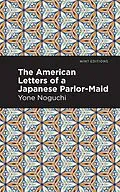Miss Morning Glory moves from Japan to America at the age of 18 with her wealthy uncle. Making her way from San Francisco to New York, she develops an interest in working class life. In New York City, she takes a job as a domestic worker. The American Letters of a Japanese Parlor Maid is a novel by Yone Noguchi.
Autorentext
Yone Noguchi (1875-1947) was a Japanese poet, novelist, and critic who wrote in both English and Japanese. Born in Tsushima, he studied the works of Thomas Carlyle and Herbert Spencer at Keio University in Tokyo, where he also practiced Zen and wrote haiku. In 1893, he moved to San Francisco and began working at a newspaper established by Japanese exiles. Under the tutelage of Joaquin Miller, an Oakland-based writer and outdoorsman, Noguchi came into his own as a poet. He published two collections in 1897 before moving to New York via Chicago. In 1901, he published The American Diary of a Japanese Girl, his debut novel. Noguchi soon tired of America, however, and sailed to England where he published a third book of poems and made connections with such writers as William Butler Yeats and Thomas Hardy. Reinvigorated and determined to continue his career, he returned to New York in 1903, but left for Japan the following year following the end of his marriage to journalist and educator Léonie Gilmour, with whom he had a son. As the Russo-Japanese War brought his nation onto the world stage, Noguchi became known as a literary critic for the Japan Times and focused on advising such Western playwrights as Yeats to study the classical Noh drama. He spent the second decade of the century as a prominent international lecturer, mainly in Europe and Britain. In 1920, Noguchi published Japanese Hokkus, a collection of short poems, before turning his attention to Japanese-language verse. As Japan moved closer toward war with the West, Noguchi turned from leftist politics to the nationalism supported by his country's leaders, straining his relationship with Bengali poet Rabindranath Tagore and distancing himself from his former colleagues around the world. In 1945, his home in Tokyo was destroyed in the devastating American firebombing of the city; he died only two years later, having reconnected with his son Isamu.
Klappentext
The American Letters of a Japanese Parlor Maid (1905) is a novel by Yone Noguchi. Styled as a fascinating tell-all written by a young Japanese tourist, Noguchi's novel is the sequel to The American Diary of a Japanese Girl (1901). Composed with the assistance of Léonie Gilmour and Blanche Partington, The American Letters of a Japanese Parlor Maid was Noguchi's second novel and a major departure from his poetry at the time. An 18-year-old Japanese woman going by the name Miss Morning Glory embarks on a journey from her native country to the United States. Accompanied by her uncle, a wealthy industrialist, Morning Glory arrives in San Francisco via steamship. She eventually makes her way to New York City, where she becomes interested in the lives of the working class and decides to test the waters of the American Dream for herself. Despite her fortunate background, she settles for a role as a parlor maid. With her abundant wit and humorous outlook, Morning Glory records in her letters a foreigner's view of American life, all of its traditions, quirks, frustrations, and glorious delusions. Through her eyes we see the country in a strange new light, perhaps more truth than fiction. With a beautifully designed cover and professionally typeset manuscript, this edition of Yone Noguchi's The American Letters of a Japanese Parlor Maid is a classic of Japanese American literature reimagined for modern readers.
